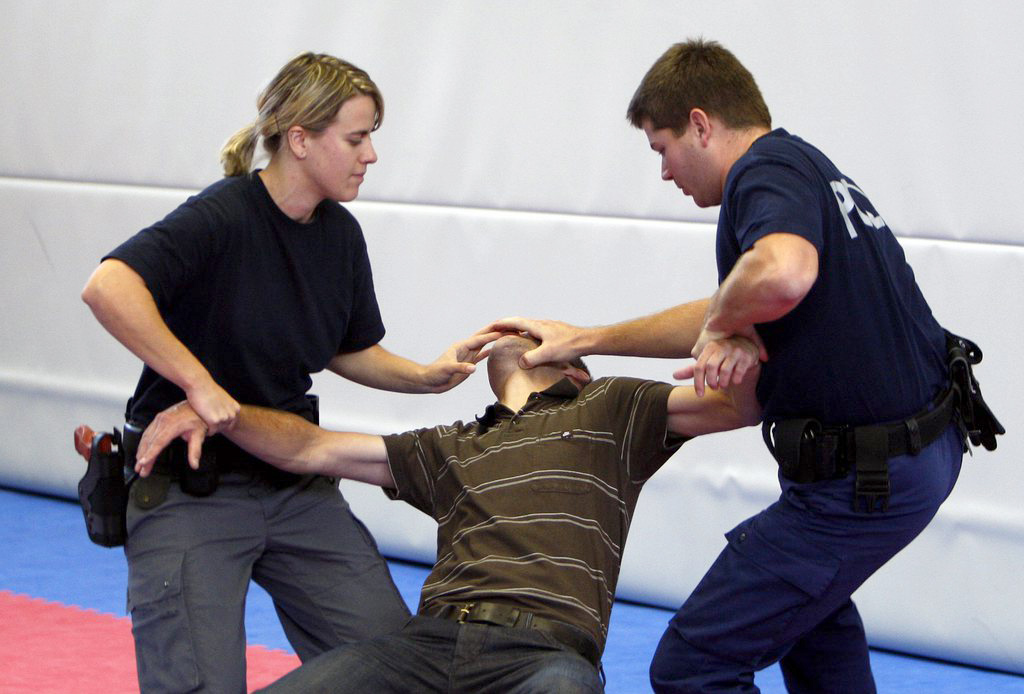Managing the police in the 21st century

Switzerland prides itself on its federal system which gives it its “unity in diversity”. The cantons jealously guard their autonomy, but it’s a system which faces challenges as society changes and more synergies are needed.
Take the police forces: cantonal sovereignty over the police is inscribed in the Swiss constitution; 26 cantons, 26 police ministers, 26 police chiefs.
“In the 21st century it might seem a bit incongruous, but the system is tried and tested,” explained Christophe Koller, of the Swiss Graduate School of Public Administration, and project leader of BADAC, the database for Swiss cantons and cities.
Roger Schneeberger, general secretary of the Cantonal Conference of Justice and Police Directors (CCJPD), which brings together the relevant ministers of all the cantons, enlarged further: “In the Swiss system the cantons are like independent states which have come together in a federation,” he told swissinfo.ch.
While it made sense to hand over some areas of competence to the federal authorities, they decided that areas like the police are better handled at local level, he explained.
The central Swiss canton of Uri, for example, has no big cities: red light districts, organised drug dealing and hooliganism are not major priorities there. On the other hand, it lies on a major transport route: the northern entrances of the Gotthard road and rail tunnels are in its territory. Clearly it needs more traffic police than criminal police. An urban border canton, like Basel City, obviously faces quite different problems.
“That’s why the police is organised at cantonal level. It means each canton can put together the police force it needs.”

More
Reconciling majority and minority interests – or not
Cooperation
That’s well and good, but sometimes a single canton does not have the resources to deal with specific circumstances. Schneeberger quoted the example of policing a major football tournament that crosses cantonal borders.
This is why the different police forces have signed a number of agreements, or concordats, between them to lay down the exact mechanisms of cooperation. Once they have been hammered out they are put to the cantonal parliaments, and if passed, have the force of law. Some have been agreed by all 26 cantons, others by only a few.
Koller says opinions differ as to how well the concordat system works – cantonal ministers and parliaments, police chiefs, the policemen themselves all have their own considerations.
Schneeberger is more positive.
“I can’t say that the CCJPD can find a solution everywhere there are problems; there are different points of view. Sometimes there are concordats that we hope everyone will sign, but some cantons turn them down. But it’s better to try to find solutions than to do nothing.”
All Swiss police go through the same basic training, and they end up with a federal qualification.
This means that they can in theory work anywhere in the country.
However, each cantonal force sets its own admission rules: there could be different age and height requirements, for example.
Each canton has its own uniform and police car markings.
Inter-cantonal merger
A new idea is afoot to boost cooperation between the two smallest cantons in French-speaking Switzerland, Jura and Neuchatel: the creation of a joint force, totalling about 600 members – about the average for French-speaking cantonal police forces.
Olivier Guéniat, chief of the Jura police, described this to swissinfo.ch as a “win-win situation”: some posts could be amalgamated, which would free up staff for operational duties without increasing costs.
What ordinary people want is to see a police presence and to know the police will be prompt in responding to calls, he says. He realises that some people might have a political objection to the canton abandoning one of its sovereign tasks, but he believes that would be misplaced.
“I think members of parliament realise that regionalisation makes sense as a response to criminals who couldn’t give a toss about borders,” he told swissinfo.ch.
His counterpart in Neuchatel, Pascal Luthi, explained that there would be a completely new kind of body, on which both cantons will be equally represented, overseeing the inter-cantonal force, to which the new single police chief will be subordinate.
Politically, each canton will keep its police minister, he explained.
“The idea is to merge the tools, but not to force the cantons to follow the same policy. Although one might imagine that if they take radically different approaches, that could be a problem.”
Both police chiefs stressed that a joint force will make it easier to deal with serious crime, and will also increase flexibility. In canton Jura, for example, with a police force of only 130, there is often only one person looking after a specific aspect of infrastructural support: if they are ill, there is no-one. Small specialist teams are manpower intensive: if the team is drawn from both cantons and serves both, this is much more efficient.
But sensitive issues like traffic and dealing with the public should be decided locally, said Luthi.
Established in 2000 when all federal police tasks were merged into a single agency.
Its headquarters are in Bern, and it currently employs over 870 staff.
It has different services, for example the Federal Criminal Police, the Federal Security Service, the Cybercrime Coordination Unit Switzerland and the Money Laundering Reporting Office.
Its criminal investigations of particular complexity of an international and/or interdisciplinary nature. These include terrorism, organised crime and national security.
Among its security duties are the protection of federal officials, including members of the government and or parliament and of people and buildings afforded protection under international law.
Administrative tasks include searching the internet for suspect matter (such as child pornography) and gathering data about suspicious financial transactions.
Fedpol also supports and coordinates investigations and exchange of information with other relevant bodies at home and abroad.
“The competences are clearly laid out,” Fedpol spokesman Stefan Kunfermann told swissinfo.ch. “It works as a partnership.”
The way of the future?
The merger is only at its preliminary stages. The two cantonal governments have insisted that the parliaments should discuss the matter before credits are granted to proceed with a study to work out the precise details.
“If the parliaments say they aren’t interested, that’s the end of that,” explained Guéniat.
The devil is likely to be in the detail, as Guéniat admitted: “We shall have to discuss how the administration will work, where it will be based. It will arouse a lot of emotion.”
So far, only the security committee of the Jura parliament has been presented with the feasibility report. Neuchatel is lagging behind – as Luthi explained, it’s not easy to synchronise the calendars of the two cantons, which have different political considerations and circumstances.
“Managing the calendar is an important aspect of this project: each side has to make small compromises. But if we think we are going to have a single police force one day, we have to be able to align our calendars at this stage!”
If all goes well, the peoples of the two cantons could be invited to vote on the issue in 2015 at the earliest – but then it will take time to implement.
And is this the way things are set to go in Switzerland as a whole?
“Everyone in Switzerland at the moment thinks they need to coordinate much more, and there are lots more synergies to be found between police forces,” said Luthi.
“I know the small cantons of central Switzerland are watching us with a lot of interest. Ten or so years ago there was a plan for merging the police in central Switzerland, which came to nothing. But I think some people are still convinced that it could be a chance for them.”
“If you ask me to look forward one generation, a single police force in French-speaking Switzerland would not be an absurd idea. But it’s not on the agenda.”
Each canton has its own independent police forces. In 15 cantons there are both cantonal and municipal forces.
For example, the cities of canton Zurich have their own forces separate from that of the canton.
In some cantons there is only one level of police. This includes the majority of the smaller ones, but also some as big as Bern.
In others, responsibility for the police has been partly devolved to the communes.
Candidates for the post of cantonal police chief do not necessarily have a police background, nor do they need to come from the canton in question.
The police chiefs have an umbrella organisation, the Conference of Swiss Cantonal Police Chiefs.
Each cantonal government has a minister responsible for the police; they are linked in an umbrella organisation called the Conference of Cantonal Justice and Police Ministers.
Cooperation between cantons is regulated by agreements, or concordats, which have the force of law once they have been approved by the relevant cantonal parliaments.

In compliance with the JTI standards
More: SWI swissinfo.ch certified by the Journalism Trust Initiative









You can find an overview of ongoing debates with our journalists here . Please join us!
If you want to start a conversation about a topic raised in this article or want to report factual errors, email us at english@swissinfo.ch.